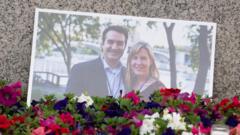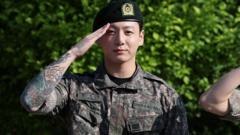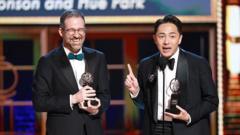With the shadow of last December's martial law still looming, opposition leader Lee Jae-myung, clad in a bullet-proof vest at rallies, aims to unify a fractured electorate. The election becomes a referendum on the controversial administration of former President Yoon Suk Yeol, who was impeached after the attempted takeover. Voter sentiments are more polarized than ever, with the future of South Korea's democracy hanging in the balance.
South Korea Faces Pivotal Election in Wake of Martial Law Fallout

South Korea Faces Pivotal Election in Wake of Martial Law Fallout
As South Korea approaches a crucial election, the populace seeks healing and stability following a tumultuous martial law crisis that has deeply divided the nation.
The striking feature of this election is the opposition candidate, Lee Jae-myung, who has taken to the campaign trail in a bullet-proof vest, underscoring the heightened tensions following a crisis that shook South Korea last December. Lee's presence, protected by security personnel, reflects the broader instability that gripped the nation when President Yoon Suk Yeol attempted a military coup. His failure, met with strong public resistance, led to his impeachment and has now placed the country in a precarious state with this snap election determining the path forward.
The swift dissolution of Yoon's leadership has intensified political polarization, making it common to encounter extreme rhetoric during protests. As Lee gears up for his presidential bid, he has faced serious threats to his life, with his team uncovering plots against him, accentuating the dangers of South Korea's current political climate. As the nation yearns for calm and direction, this election presents an essential opportunity for reconciliation and a return to stability.
The ruling People Power Party (PPP) faces significant challenges, primarily due to its association with the unpopular former president. Kim Moon-soo, the PPP candidate and Yoon's former labour minister, has drawn scrutiny for his delayed apology regarding the martial law crisis. The election has evolved into a referendum on these events, especially as Lee capitalizes on public sentiment to depict himself as a guardian of democracy. He promises to reform the constitution to prevent any future martial law declarations, positioning himself as a unifying candidate who can bridge the political divide.
Recent polling indicates that Lee is gaining ground on Kim, who is labeling himself the "fair and just candidate." However, Kim's supporters often back him reluctantly, not out of a belief in his policies but merely as an alternative to Lee. Despite Lee's divisive past and ongoing legal battles, he is attracting support from diverse political factions who are united in their desire to thwart another military takeover.
As Lee redefines his political stance, he appears to be strategically courting centrist voters by adopting policies previously associated with the right, including a focus on strengthening ties with the United States. This departure from his earlier leftist perspectives has led to a rebranding that leaves many voters questioning his true intentions. Some analysts believe that Lee's shift is more than mere electoral strategy; it reflects a genuine attempt to build trust on a broader scale.
The stakes of this election cannot be overstated; as citizens prepare to cast their votes, they remember the mass protests against Yoon's attempted takeover. There is a palpable yearning for a resolution that will restore confidence in their democracy and allow them to tackle pressing issues that have fallen by the wayside. Voters are eager for transparency and accountability from whoever emerges victorious.
With polling suggesting Lee may claim a substantive victory, he could find himself with considerable mandate power, necessitating a responsible approach to governance. The unfolding reality of this election will not only determine the immediate future of South Korea but also dictate the longer-term trajectory of its democratic institutions, providing an urgent reminder of the fragility of political power and civic obligation.





















